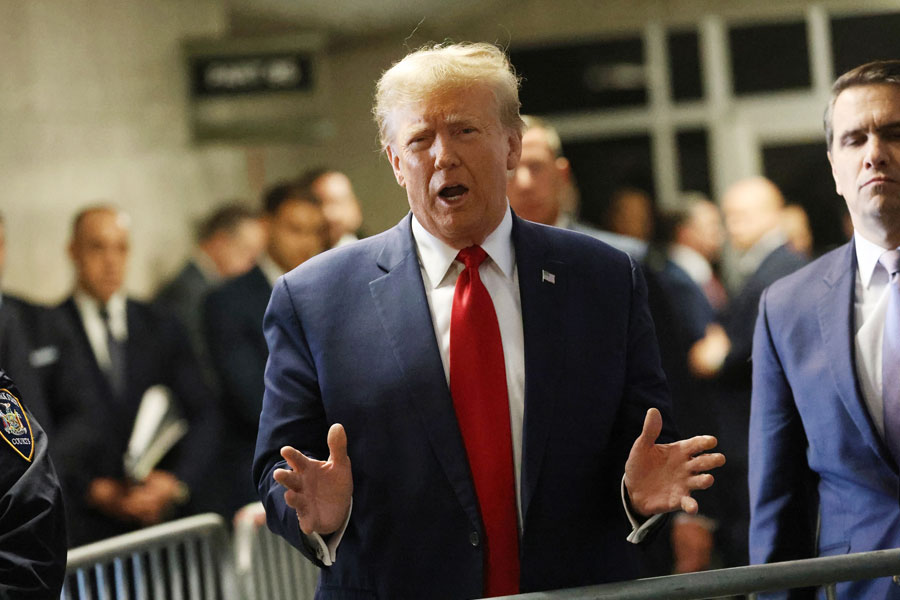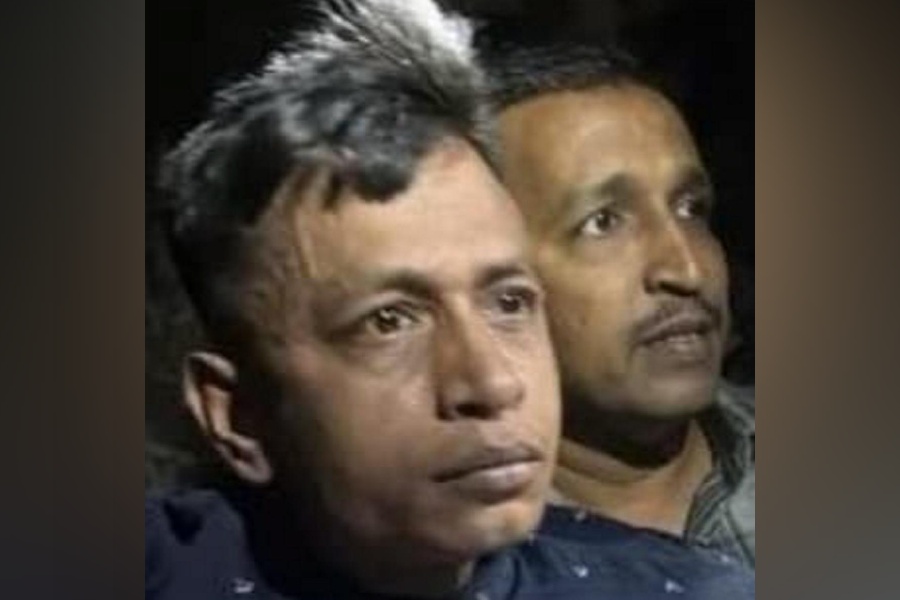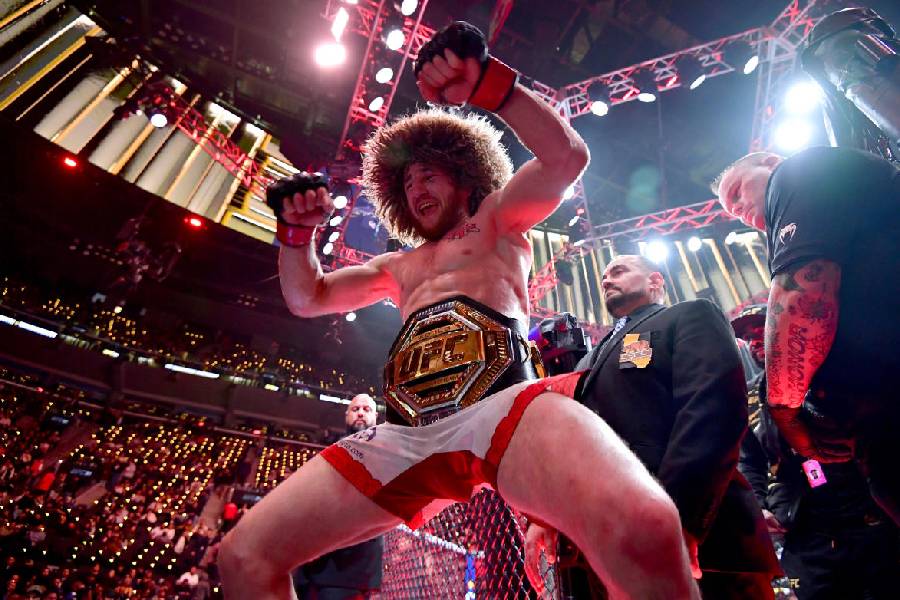A judge on Monday rejected Donald Trump’s argument that a recent Supreme Court ruling had nullified his criminal case in New York, upholding the former and future president’s felony conviction for falsifying records to cover up a sex scandal.
The judge’s ruling preserves, at least for now, the stain of Trump’s criminal conviction. And if the decision withstands an appeal, Trump could become the first felon to serve as president.
The ruling, which addressed the Supreme Court’s decision to grant presidents broad immunity for their official actions, thwarted only the first of several legal maneuvers Trump has concocted to clear his record of 34 felonies before returning to the White House.
Prosecutors had argued that the Supreme Court’s decision had “no bearing on this prosecution,” noting that Trump was convicted of orchestrating a scheme involving a personal and political crisis that predated his presidency.
But Trump’s lawyers seized on a particularly contentious portion of the high court’s ruling, which prohibited prosecutors from introducing evidence involving a president’s official acts even in a case about private misconduct. They argued that testimony from former White House employees had contaminated the verdict.
In the first significant interpretation of that polarizing opinion, the New York judge who oversaw the trial sided with prosecutors, concluding that the testimony centered on Trump’s unofficial conduct.
“The People’s use of these acts as evidence of the decidedly personal acts of falsifying business records poses no danger of intrusion on the authority and function of the executive branch,” the judge, Juan M. Merchan, wrote in a 41-page decision.
And even if the evidence was “admitted in error, such error was harmless,” he added, noting the “overwhelming evidence of guilt” introduced at trial.
A spokesperson for Trump, Steven Cheung, criticized the ruling, calling it “a direct violation of the Supreme Court’s decision on immunity.”
“This lawless case should have never been brought, and the Constitution demands that it be immediately dismissed,” Cheung said.
A spokesperson for Manhattan District Attorney Alvin Bragg declined to comment.
Merchan will not have the final say on the immunity issue, and Trump can now appeal his ruling. Even if Trump loses in New York’s appellate courts, he can ultimately take the matter to a friendlier venue: the Supreme Court, which has adopted an expansive view of presidential power and where the 6-3 conservative majority includes three justices he appointed during his first term.
And the matter of immunity is hardly Trump’s only path to unwinding his New York conviction. He has also sought to leverage his electoral victory to throw out the case, citing a 1963 law that enshrined the importance of a smooth transition into the presidency, and a long-standing Justice Department policy that states a sitting president cannot face federal criminal prosecution.
Even though the New York case was brought by state prosecutors and has already resulted in a conviction, Trump’s lawyers have argued that keeping it alive would impose “unconstitutional impediments to President Trump’s ability to govern.”
Bragg’s office, which prosecuted Trump, has opposed any effort to overturn the jury’s verdict, saying that would amount to an “extreme remedy.”
Instead, the prosecutors have signaled a willingness to freeze the case for four years while Trump holds office, a move that would indefinitely postpone his sentencing.
“This type of time-limited accommodation is far more appropriate than the sweeping relief that defendant requests here, which would render the indictment and jury verdict in this case a nullity and eliminate his accountability for the crimes that a jury of his peers found he committed by proof beyond a reasonable doubt,” the prosecutors wrote in a recent court filing.
Merchan, who could rule as soon as this week on Trump’s election-related dismissal bid, has already paused the sentencing several times. Trump faces up to four years in prison, but he is unlikely to receive more than a few weeks or months behind bars in New York, according to legal experts.
Trump cannot be sent to jail while he is president, and the judge can choose to hold off on sentencing him until after his term ends. If Merchan decides instead to address the matter now, he could choose to uphold the conviction but impose no jail time or any other punishment.
If Trump manages to avoid all punishment whatsoever in his only criminal case to make it to trial, it would complete a stunning turnabout from earlier this year, when he faced four indictments in four different jurisdictions.
The federal special counsel who brought two of those cases, one in Washington, D.C., and the other in Florida, recently shut down both of them, bowing to the Justice Department’s policy against prosecuting sitting presidents federally.
In Georgia, where a local prosecutor accused Trump of trying to subvert the state’s 2020 election results, Trump has already managed to delay the case indefinitely.
The Supreme Court’s immunity decision stemmed from the special counsel’s case in Washington, where Trump was accused of plotting to overturn his 2020 election loss.
The 6-3 ruling, which was decided along partisan lines, held that a former president was “entitled to at least presumptive immunity from prosecution for all his official acts.”
Within hours of the decision’s landing, Trump’s lawyers sought to link it to the Manhattan case, arguing that it invalidated the conviction.
At first blush, the two seem unrelated.
In May, a jury of 12 New Yorkers found Trump guilty of all 34 counts of falsifying business records related to covering up a porn actor’s account of a sexual encounter with him, which threatened to derail his 2016 presidential campaign.
To bury the story, Michael Cohen, Trump’s former fixer, brokered a $130,000 hush-money deal with the performer, Stormy Daniels. Trump eventually repaid Cohen, who testified that his former boss orchestrated a scheme to falsify records and hide the true purpose of the reimbursement.
Trump’s lawyers argued that, in light of the Supreme Court’s immunity ruling, prosecutors had improperly relied on evidence that involved “official communications” during his first term in the White House, including tweets he posted as president.
But many of those statements were public, the prosecutors noted, and the Supreme Court specifically exempted public information from the prohibition on using official acts as evidence.
Writing for the majority, Chief Justice John Roberts concluded that a “prosecutor may point to the public record” to illustrate an argument, even if it involves official acts.
In his ruling Monday, Merchan rejected the defense’s effort to portray the tweets as official acts, concluding that they “do not constitute the type of conduct” the Supreme Court intended to protect.
“To find otherwise would effectively mean that every statement ever uttered (or posted on social media) by a sitting president, whether personal or official, in his or her own interests or that of the country, would be protected by absolute immunity,” Merchan wrote.
Still, Trump mounted a somewhat stronger argument that the Supreme Court’s ruling now prohibits some of the testimony that was given at trial. His lawyers cited the testimony of two of Trump’s former White House employees, Hope Hicks, who served as communications director, and Madeleine Westerhout, a director of Oval Office operations.
In one crucial portion of her testimony, Hicks told the jury about a discussion she had with Trump in the White House after the hush-money deal with Daniels had come to light. Hicks said that after The Wall Street Journal broke the story, she spoke with Trump about “how to respond.”
Yet prosecutors argued that the discussions between Hicks and Trump “related solely to unofficial conduct” about the sex scandal. The prosecutors invoked the Supreme Court ruling to help their cause, noting that Roberts had written that a president can speak “in an unofficial capacity,” and that not every act a president takes is official, a holding Merchan highlighted in his ruling Monday.
The prosecutors also argued that even if Hicks’ testimony had somehow crossed a line, they had presented so much other evidence that “any error was harmless” and the guilty verdict should stand. Merchan agreed, citing an array of other evidence that prosecutors introduced at trial, including Cohen’s testimony and Trump’s own words in books he wrote.
The judge noted that he was not alone in concluding that Trump’s actions had been private, not official.
A federal judge who evaluated the case last year when Trump tried to move it out of state court concluded that the “evidence overwhelmingly suggests that the matter was a purely personal item of the president.”
The federal judge, Alvin Hellerstein, noted in his opinion that “hush money paid to an adult film star is not related to a president’s official acts.”
The New York Times News Service











